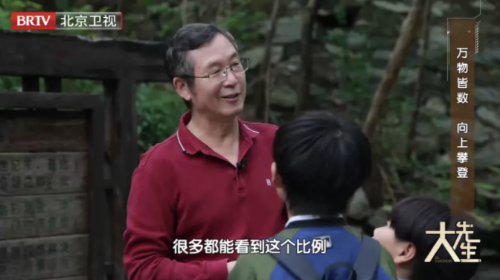Editor's Notes:
Season 3 of the educational science program "Mr. Science" has started to air on Beijing Radio and Television Station (BRTV) every Tuesday at 21:05 since July 30, 2024. Each episode features a prominent Chinese scientist who imparts wisdom and experiences to a group of university and middle school students known as the "Future Team," fostering an engaging learning environment. Here are the stories of these distinguished scientists.
Yuan Yaxiang, a distinguished academician, is a prominent figure in the global mathematics community. His pioneering work in nonlinear programming, particularly the "Yuan's Lemma," has significantly advanced the field and provided essential theoretical support for practical applications. Beyond his research, Yuan is passionate about making mathematics accessible to the public, using simple language and vivid examples to inspire a love for mathematics among students.
Yuan's early interest in mathematics was significantly influenced by his mother, despite her being illiterate. She played a crucial role in his education by engaging him with intriguing math puzzles, like the "chicken and rabbit" problem. Her unique approach made learning joyful and instilled in Yuan an early appreciation for the subject, laying a strong foundation for his passion for mathematics.
Beyond his mathematical pursuits, Yuan Yaxiang has a wide array of interests, including hiking and playing cards. During a recent hike up Baiwang Mountain with the Future Team, Yuan used the experience as a metaphor for learning mathematics. He said that climbing a mountain is akin to learning mathematics, requiring a gradual and methodical approach. More intriguingly, while appreciating the natural scenery, Yuan seamlessly integrated the charm of mathematics, showcasing the wonders of the mathematical world to those around him.
One concept Yuan highlighted during the hiking was the golden ratio, 0.618, a number that holds significant importance in mathematics and frequently appears in nature, such as in the stable structure of pyramids, the branching of tree leaves, and the shapes of flowers. These seemingly ordinary natural phenomena illustrate the harmonious coexistence of mathematics and the natural world.
Yuan explained to the Future Team that choosing the right path up a mountain is akin to applying mathematical algorithms. Each person has their own criteria, whether to pursue speed or enjoy the scenery, leading to different choices and paths. This decision-making process is a classic example of "nonlinear optimization," —selecting the best option through precise calculations and analyses under numerous constraints, a technique crucial in fields like aerospace, life sciences, and finance.
Yuan's contributions to nonlinear programming extend beyond theoretical breakthroughs to practical innovations. A notable example is the "Dai-Yuan Method," co-developed with his first doctoral student, Dai Yuhong. This method is one of the four principal approaches in nonlinear conjugate gradient methods. Dai, inspired by Yuan's 1993 book, "Numerical Methods for Nonlinear Programming," achieved this at just 24 years of age. This accomplishment not only underscores Yuan's profound expertise and international influence in nonlinear programming but also reflects his success in nurturing a new generation of talent in computational mathematics within China.
Yuan's dedication to mathematics is further exemplified by his efforts to share his research through writing, providing valuable resources for scholars and advancing mathematical education. His work continues to have a profound impact on both theoretical and applied mathematics, cementing his legacy as a leader in the field and a source of inspiration for future generations of mathematicians.

